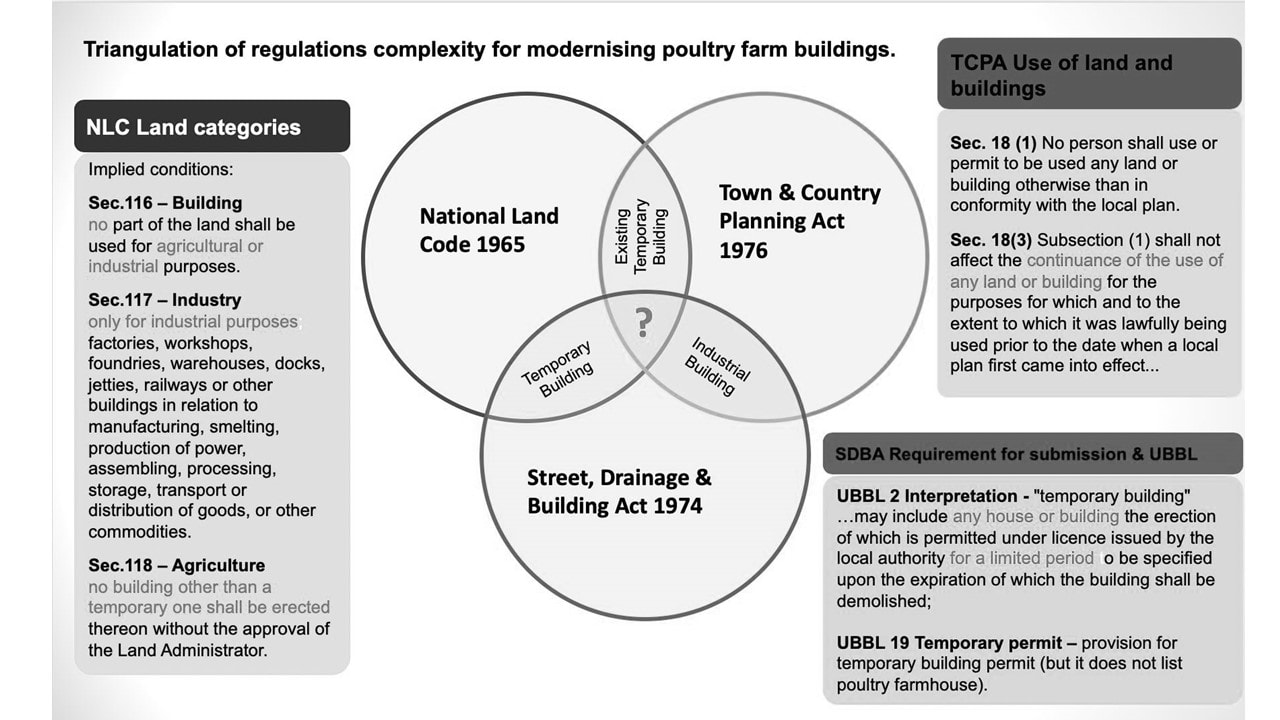THE ISSUESLet’s consider a scenario, D.Arzumi wanted to build a ‘poultry farm’ on a piece of land. The issues that needed to be considered are whether such ‘poultry farm’ can be built on that piece of land given the ‘apparent conflicting legislation’ among the National Land Code 1965 NLC, Town and Country Planning Act 1976 TCPA and Street Drainage and Building Act 1974 SDBA. THE LAWNLC provided an ‘implied conditions’ for ‘building’ that no part of the land shall be used for agriculture and industrial purposes.[1] It furthers prescribed, industrial as […]only for industrial purposes[2] and the similar could be applied to agricultural where no building other than a ‘temporary one’ shall be erected[3]. TCPA provided for [permitted] in conformity to ‘local plan’.[4] SDBA provided under the Uniform Building Bylaws 1984 UBBL that a ‘temporary building’ is a building under license from the local authorities for a specific period, only to be renewable upon expiry.[5] It furthers provide the ‘temporary permit’ excluding a category of ‘poultry farm’.[6] ...................................... [1] S.116 NLC [2] S.117 NLC [3] S.118 NLC [4] S.18(1) TCPA [5] UBBL 2 [6] UBBL 19 THE APPLICATIOND.Arzumi is confronted by the ‘priority of legislation’, which takes priority over the other? The ‘common approach’ is that and as allowed by the legislation is that ‘land-use’ is commonly governed by the ‘public policy’ under the purview of the TCPA, i.e. if one need to change the ‘land-use’ the foremost thing to do is to apply to have a Planning Permission for the change of ‘land-use’ and such may or may not even include the matter for amalgamation or otherwise. Upon the granting of Planning Permission, only the NLC takes effect. There is very little ambiguity on this ‘level of priority’ in the interpretation of both legislation. Application wise, it is the onus of the ‘land surveyors’ to execute this part of the exercise. Assuming that D.Arzumi’s land has now changed to agriculture and the implied conditions are for agriculture, that no building shall be erected on the land other than the building […] referred to subsection 4[1], which for the purpose of dwelling house of the proprietor[2]. In D.Arzumi’s case, he can build a ‘building’ but it must be ‘temporary in nature’.[3] When D.Arzumi’s Architect is called to submit the building plans for approval, it has to again, go through the provision of TCPA for the ‘Planning Permission for the Erection of Building’ and upon granting of such, he can proceed to submit to the local authorities under the provision of the UBBL. Here, the true contention of a ‘temporary building’ is a building constructed in ‘temporary building materials’[4] such as ‘wooden house’ whereas a ‘temporary permits’ gave all discretion to the local authorities if the ‘building’ does not fall within the classification of UBBL19(1).[5] ....................................... [1] S.115(1)(a) NLC [2] S.115(4)(a) NLC [3] S.118 NLC [4] UBBL 2:Intepretation, ‘[…]of materials[…] liable to rapid deterioration[…]’ [5] UBBL19(2) THE CONCLUSIONConcluding, there is no apparent conflicting as to the ‘priority’ of the legislation. To put in a ‘nutshell’ the priority as to the ‘public interest’ shall be the TCPA, NLC and SDBA via UBBL (having said that it is only a ‘bylaw’) and land is a 'state matter' as far as the constitution is of concerned. Therefore, D.Arzumi can only own a building constructed in materials such as wood for ‘perpetuity’, subject to annual renewal from the local authorities, to their ‘pleasures’.
P/S: Graphics from ‘open source’, , credited to Datuk Ar. Ezumi.[1] ........................................ [1]facebook.com/photo.php?fbid=10224470157242874&set=a.1066827632333&type=3&theater&ifg=1
0 Comments
Leave a Reply. |
Objective of this Page:Building Codes comprise of a significant amount of legislation controlling the building industry i.e. Planning, HDA, Strata and Strata Management... I am sharing these information with a caveat that these information is for educational purpose only and shall not be taken as an advice be it legal or otherwise. You should seek proper advice to your case with the relevant professionals. The author cannot guarantee the accuracy of the information so provided here. ArchivesCategories
All
|
- Home
- About
-
Practice
-
DYA + C
-
Consultant
-
Educator
- Author I am...
- Speaking Engagement >
- Attempting Law School
- Journey in USM(Arch) >
- Discourse in Studio 6 >
-
d:KON 4
>
- Actors >
-
Acts
>
- Portraiture
- A Slice of Space Time
- Box of Installation of Lights
- Radio Misreading
- Grid of Destinies
- Shelter
- Anatomy of Pain
- Tensigrity of Ego
- Of Prisons and Walls
- Forest of Nails
- Curtain of Fears
- Dissolution of the Ego
- If it's Ain't Broken it's Ain't Worth Mending
- Flight of Freedom
- Cross of Complexity and Contradiction
- interrogation
- Stage >
- Play
- Approach
- Galleria >
- External Critique >
- Philosophy
- Codes Regulations & Standards >
- Photo Essays
- Contact



 RSS Feed
RSS Feed
